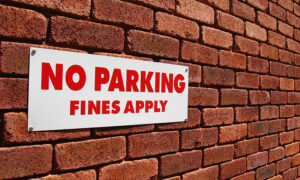Everything You Should Know About HOA Fines

When homeowners violate the rules, they may face HOA fines. Before an HOA can fine homeowners, it is important to understand how these fines work and what rights homeowners have. In the same way, board members must know the proper procedures for levying fines to avoid potential liability.
Browse By Category
Sign up for Our Newsletter
When homeowners violate the rules, they may face HOA fines. Before an HOA can fine homeowners, it is important to understand how these fines work and what rights homeowners have. In the same way, board members must know the proper procedures for levying fines to avoid potential liability.
What Are HOA Fines?
Homeowner association fines are monetary penalties for violations. They enforce the rules and regulations of an HOA community. Fines can differ from one association to another, so there is no standard dollar amount. Moreover, what an HOA can fine a homeowner for and whether or not an HOA has the authority to issue a fine can vary.
Examples of HOA fines for violations include the following:
- HOA parking fines
- HOA noise complaint fines
- Fines for violating pet restrictions
- HOA architectural violation fines
- Fines for violating landscaping rules
Can HOA Fine You?
Two things dictate whether or not an association can issue HOA violation fines: state laws and the association’s governing documents.
State Laws
Are HOA fines legal? To determine this, it is essential to review state laws. States often give homeowners associations the authority to levy fines for violations. However, many state laws require HOAs to give homeowners an opportunity to be heard before issuing a fine, also known as a disciplinary hearing.
In North Carolina, for instance, Section 47F‑3‑107.1 of the Planned Community Act dictates that an HOA must give a homeowner notice of the violation and an opportunity to be heard. The act also establishes other requirements and procedures for violation enforcement.
Other states, such as California, have additional mandates. Civil Code Section 5310 requires HOAs to provide an annual policy statement that includes a schedule of penalties for violations, among other things. Associations must distribute this policy statement every year within 30 to 90 days before the end of its fiscal year.
Governing Documents
Are HOA fines enforceable? Apart from state laws, an HOA’s governing documents allow it to charge penalties for violations. This is how homeowners can determine whether fines are enforceable as a form of disciplinary action.
Homeowners will typically find the fine policy within the governing documents, specifically the CC&Rs. In addition to a fine schedule, this fine policy should dictate the requirements and procedures for levying fines. This includes notice requirements, disciplinary hearings, and other things.
Are HOA Fines Without Proof Allowed?
 Whether an HOA can fine a homeowner without proof of a violation depends on state laws and the governing documents. However, associations do not usually need to provide evidence of the violation before issuing a fine. That said, homeowners can attend a disciplinary hearing and present evidence supporting their case.
Whether an HOA can fine a homeowner without proof of a violation depends on state laws and the governing documents. However, associations do not usually need to provide evidence of the violation before issuing a fine. That said, homeowners can attend a disciplinary hearing and present evidence supporting their case.
Where Do Fines Go?
Fines are not items that an HOA board includes in the annual budget. There is no way to accurately account for how much an HOA will collect in fines in a given year. Furthermore, an HOA should not rely on fines as a source of revenue. Regular HOA fees fill that role.
Every HOA is different when it comes to where fines go. It ultimately depends on an association’s governing documents. Some HOAs deposit collected fines directly into the operating fund to supplement the budget. Other HOAs have a separate general fund. Then, some HOAs deposit the collected amounts into the reserve account at the end of the year.
Unless an HOA has a severe compliance problem, collected fines usually only amount to a few hundred dollars annually. It is not enough to make a huge dent in the budget, but it can help in other ways.
Do You Have to Pay HOA Fines?
Homeowners agree to adhere to the HOA’s rules and face consequences for any violations upon joining the HOA. As such, if the HOA has the authority to levy fines and does so in a procedurally correct manner, homeowners do need to pay fines.
What Happens If You Don’t Pay HOA Fines?
Homeowners who fail to pay fines may face several possible penalties. These include late fees, suspension of privileges, legal action, liens, and even foreclosure.
- Late Fees. Some HOAs charge additional fees for HOA late payment fines. However, checking state laws and the CC&Rs before pursuing this route is best. In California, for example, HOAs can’t levy late fees on unpaid fines.
- Suspension of Privileges. An HOA may temporarily revoke a member’s privileges, such as access to amenities, until the member settles their unpaid fines.
- Legal Action. An HOA may attempt to collect unpaid fines by suing in small claims court or the superior court.
- Liens. In some cases, an HOA may be able to place a lien on a home for unpaid fines. North Carolina law, for instance, permits this.
- Foreclosure. As with liens, some HOAs may have the authority to foreclose on a home for unpaid fines. There may be restrictions, though, on what foreclosure manner an HOA can take (judicial or non-judicial).
Can You Ignore HOA Fines?
Homeowners may want to know how to fight and refuse to pay HOA fines. Unfortunately, if the HOA has the authority to levy a fine and does so in a procedurally correct way, homeowners have no other choice. Refusing to settle the unpaid fines could only result in the above consequences.
A homeowner may try to appeal the fine or prove their innocence at a disciplinary hearing. However, there is no guarantee they will win their case. If an owner does not have the financial means to pay the fine, it is best to approach the HOA board and attempt a negotiation.
How Much Can an HOA Fine You?
 State laws and an HOA’s governing documents may limit the dollar amount of fines. For instance, Section 47F‑3‑107.1 of the North Carolina Planned Community Act caps fines at $100. However, not all states have laws that regulate this.
State laws and an HOA’s governing documents may limit the dollar amount of fines. For instance, Section 47F‑3‑107.1 of the North Carolina Planned Community Act caps fines at $100. However, not all states have laws that regulate this.
An HOA board should exercise caution when devising a fine schedule. A fine that is too low may not deter homeowners from committing a violation, while a too high fine may be deemed unreasonable. It is also best to tailor the fine amount according to the severity of the violation. A violation that endangers the safety of others, for instance, should carry a higher penalty.
The Final Word
Fines play a key role in violation enforcement within an HOA community. However, it is essential to understand the laws, regulations, and provisions governing how fines are issued. Board members should educate themselves to avoid exposing the association to liability.
An HOA management company can help associations with collecting fines and enforcing rules. Look for the best one in your area using our online directory!
RELATED ARTICLES:
- HOA Lien: What Is It And What To Do If Your Home Has It
- What If An HOA Violates Its Own Rules? What Can Homeowners Do?
- Do HOA Rules Override State Laws And City Ordinances?
Trending Now
Related Article
Sign up for Our Monthly Newsletter
Sign up below for monthly updates on all HOA Resource
















